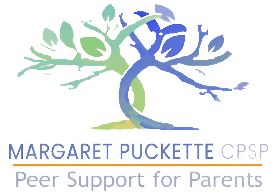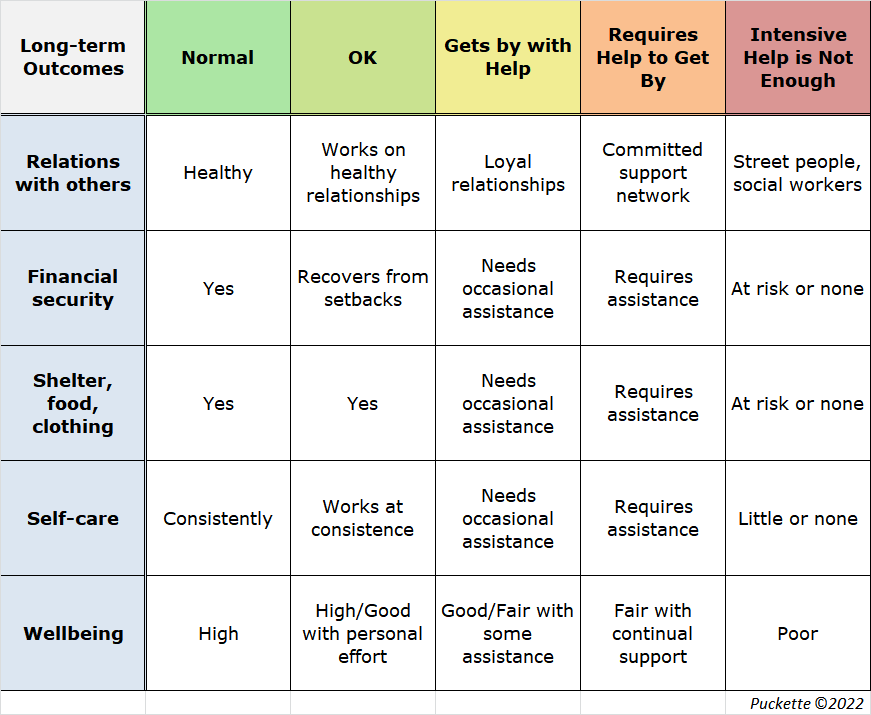
Are you scared for your child’s future? Is he or she is falling behind? On a scale of 1 to 5, where 1 is “Normal” and 5 is “Worst Case Scenario”, what will your child’s future adulthood look like?
This chart depicts a spectrum of outcomes of mentally ill children when they become adults. No matter how ill your child is, if he or she gets support and treatment early, their future adult life could end up in the NORMAL column, or well out of the RED column. A network of family, friends, and professional staff can prevent the worst-case scenario in the far right column, and move them in the direction of normalcy.
Of the outcomes, “wellbeing” is possibly the most important.
This is a checklist of childhood problems that lead to poor futures in adulthood. Which of these can you directly address now, and which in the near term, and which in the long term. These are critical. Even if you partially improve any of them, and even if it takes time, your child’s future can be protected from loss of wellbeing.
- Friend problems: they have inappropriate friends, or no friends, or they mistreat friends (and siblings).
- Behavior problems: they do or say disturbing things (swearing, hurting, breaking, manipulating, sinking in depression, attempting suicide…). Everyone is stressed.
- School problems: disruptive behavior; poor grades (or a sudden drop in good grades); bullying or being bullied.
- Health problems: physical health problems become mental health problems, and vice versa:
- trouble with sleep
- digestive system and gut problems
- poor diet and lack of exercise
- epilepsy or neurological disorders
- hormones during puberty
- substance abuse.
We designate legal adulthood between the ages 18 and 21. That’s too young. Many normal healthy young people at this age are immature and irresponsible, but your son or daughter may lag well behind them. Your child may need support and rescuing well into the 20’s or early 30’s–this is not unusual. You’ll survive the marathon of tough years by committing to the long term and taking lots of little steps.
Pace yourself, find support for yourself, and protect your mental health.
There is reason for hope. Your child may take many horrible directions in their teens and 20’s, and you may feel hopeless about their future, or helpless as you witness their life nosedive. If you can hang on and marshal support, your child will find a circuitous path to recovery. It will have sharp turns and back steps and falls, but they’ll find it… and enter stable adulthood.
Some parents and families have seen the worst. They’ve endured violence due to their child’s addiction; sat in court when their son or daughter was convicted of a crime; or waited in an Emergency Room after a serious mental health crisis. They also lived to see their child achieve sanity, finish their education, live independently, and develop good relationships. This can happen even when mental health is very poor.
How two parents handled a “worst case scenario” and supported their child’s wellbeing:
These are true stories of mothers who stuck by their very ill adult children and provided what little they could to bring a bit of wellbeing. These mothers found some peace by simply doing what they could. Their child still had hope.
One had a grown son with schizophrenia and a heroin addiction who lived in squalor in supported housing. He spent all of his disability assistance money on heroin and nothing else. Her efforts to help him met with verbal abuse and threats of violence, and she feared for her safety. What could she do, witness his slow suicide by starvation or overdose? She arranged to visit him once a week in the parking lot, and brought 2 sacks of groceries in the trunk of her car. He was to come out and get the groceries while she stood at a safe distance. This worked. He was still verbally abusive when he got the groceries, but he got food and she stayed safe. Did he have wellbeing? Was his life humane?
He lived indoors
There was enough food, and occasionally clean clothing
His mother’s interactions with social services and police led to some health care
A support system was available when he was ready for help.
One had a son addicted to methamphetamine who was lost to the streets. One day, she discovered a nest of old clothes and rags in an overgrown area behind her garage, and instinctively knew it was from her son. “Good,” she thought, “He’s alive; I can keep him safe.” She rarely saw him come and go, but she replaced the rags with clean blankets and a sleeping bag, and put out food for him, and provided a tent. She couldn’t free her son from addiction, but she could keep him safe from the streets and its desperate people, and fed and sheltered in a way he accepted.
Like in the previous story, her son had a modicum of safety and support, and ongoing monitoring if he was ready for help.
–Margaret
Scroll down and comment, ask a question, or share your story. I may be able to help you prevent your child from losing a their future to their condition and circumstances. Even though your child is an adult, you have many options and more power for good than it may seem.


Recent Comments